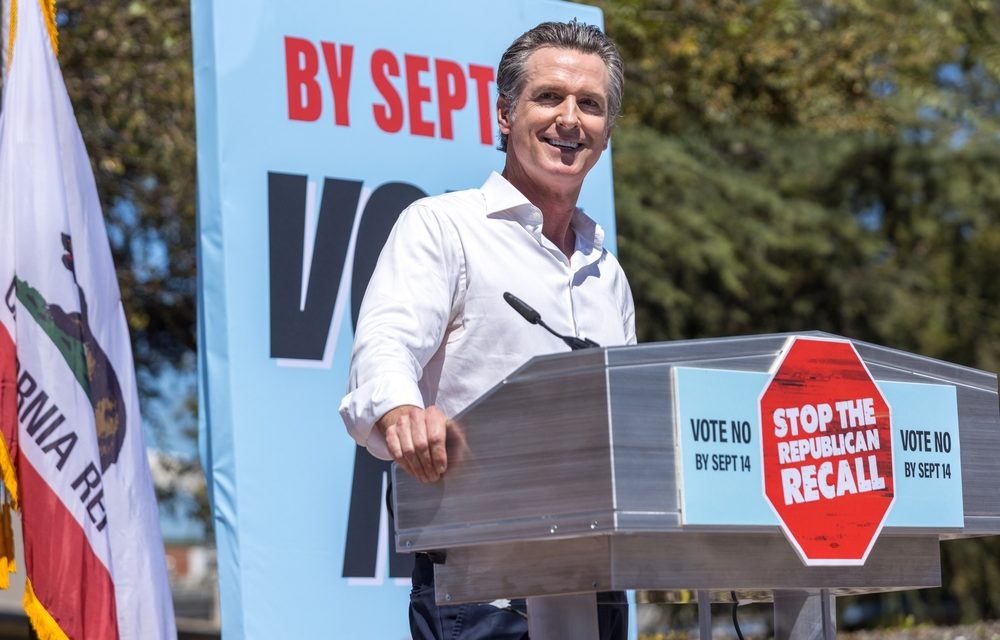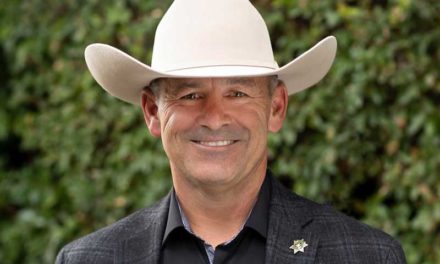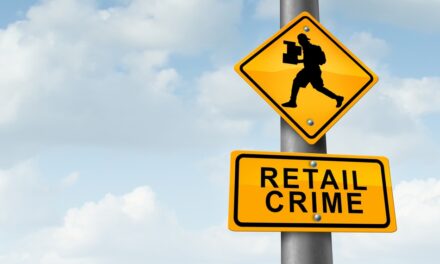A GOP-led Recall Attempt to Oust Gov. Gavin Newsom Appears Likely to Fail
Election Day has dawned in the Golden State in which a Republican-led recall attempt appears ready to backfire thanks to a newly invigorated Democratic base. If so, Gavin Newsom is likely to be the first to survive a recall election.
The Democratic governor has spent months aggressively campaigning against the recall effort, which he has characterized as a radical GOP power grab that has left his political career and California’s future hanging in the balance.
With his more than $70 million war chest, Newsom has blanketed airwaves and digital spaces with anti-recall ads featuring prominent Democrats such as Bernie Sanders, Elizabeth Warren and former President Barack Obama. The governor has also made numerous campaign stops across the state to directly reach Democratic voters, and is even set to campaign alongside President Joe Biden in Long Beach late Monday.
Newsom has also taken up new campaign messages to boost Democratic turnout, slamming his main opponent’s opposition to COVID mitigation measures. Among the 46 candidates running in the recall election, conservative talk show host Larry Elder has become the clear Republican frontrunner by speaking out against mask and vaccine mandates.
While Newsom was projected to face more of a tight race in the election just a month ago, his heavy campaign efforts seem to be paying off. Experts, recent polling and early ballot return rates all indicate that Newsom is now on course to easily defeat the recall effort.
“Its going to take a major polling miss for the recall effort to succeed at this point,” Democratic consultant Michael Soneff told CNBC.. “Newsom’s chances are very good. I’d rather be Gavin Newsom than anybody else in this race.”
Despite Republican voters being outnumbered by Democrats in the state by nearly 2 to 1, complacency among Newsom’s Democratic supporters posed a potential threat to his chances of surviving the recall.
However, a poll released Friday by the Berkeley Institute of Governmental Studies and the Los Angeles Times indicates that Democratic voters have become more engaged in the upcoming recall election. Sixty percent of likely voters in California said they would vote to keep Newsom in office, while just 39% would vote to recall him.
This is the first poll that has shown Newsom defeating the recall by more than 20 percentage points, a jump from the previous poll conducted by the same institutions just six weeks ago. The July poll showed a much closer race, with 50% of likely voters favoring Newsom’s retention and 47% favoring his recall.
A September poll from the Public Policy Institute of California showed 58% of likely voters in favor of Newsom, while 39% wanted to remove him. SurveyUSA and The San Diego Union Tribune found 54% of likely voters in favor of keeping Newsom, a major swing from their August poll in which 51% favored removing him.
“It appears that the enthusiasm gap between Republicans and Democrats that has given so much life to the recall early on seems to have dissipated,” said Dan Schnur, a politics professor at three California universities who previously led the California Fair Political Practices Commission.
“Newsom spent most of the summer trying to convince the Democratic base that [the recall] is worth their time and attention. And it’s clear from the polls that he’s been successful in those efforts,” Schnur added.
This increased engagement among Democrats is also reflected in the rates of early mail-in ballot returns.
The poll conducted by the Berkeley Institute of Governmental Studies and The Los Angeles Times estimates that mail-in ballots will account for approximately half of the electorate.
As of Saturday, registered Democratic voters made up about 52% of the nearly 7,800,000 ballots returned so far, according to daily data from Political Data Intelligence. Republicans lag far behind, only making up 25% of them.
Republicans were expected to return ballots faster than Democrats due to their outsized interest in the recall election in the months prior, according to Soneff. Now, they are left scrambling to catch up.
“Democrats have significantly outperformed Republicans in returning ballots up to this point and have opened up a colossal lead. Republicans are trying to close the gap and are definitely making some progress, but in the end, they’re not going to,” Soneff continued.
While more than 14,470,000 ballots have yet to be returned, Soneff said the most-recent return rates are “undoubtedly a great start for Newsom.”
Elder, who has been a widely known figure in California for decades, has become the only viable candidate who could replace Newsom. Thirty-eight percent of likely voters said they would support his candidacy if Newsom were to be replaced, which is up from 18% in late July, according to the poll conducted by the Berkeley Institute of Governmental Studies and The Los Angeles Times.
Support for other Republican candidates has receded, and the next candidate after Elder, Kevin Paffrath, falls short with only 10% of likely voters’ support, according to the poll.
On election day, Republicans are expected to outperform Democrats in in-person voting, according to Soneff.
This is also reflected in the poll conducted by the Berkeley Institute of Governmental Studies and The Los Angeles Times. Of the likely voters who said they would vote in person on Election Day, 77% said they would vote to recall the governor.
However, given the substantial Democratic lead in mail-in ballots so far, this is not expected to have a significant impact on the outcome of the election, according to what Soneff told CNBC
Allegations that Newsom mishandled the state’s response to the coronavirus pandemic fueled the Republican-led recall effort in 2020.
However, in the weeks leading up to the recall election, Newsom’s campaign has seized on pandemic fears to help secure his likely victory.
Californians named coronavirus as the top issue facing the state, according to a September survey conducted by the Public Policy Institute of California, or PPIC. Many of Newsom’s anti-recall ads and campaign stops in recent weeks have zeroed in on this, warning voters about what may happen to the state’s coronavirus conditions if a Republican opponent takes his place in office.
“Republicans are trying to recall [Newsom] from office and overturn common-sense Covid safety measures for health-care workers and school staff,” former President Barack Obama said in the newest anti-recall ad.
Each voter’s ballot “could be the difference between protecting our kids and putting them at risk, helping Californians recover or taking us backwards,” Obama added.
Another anti-recall ad slammed Elder, the top Republican candidate in the race, alleging that he “pedaled deadly conspiracy theories and would eliminate vaccine mandates on day one.”
Elder vowed to overturn all vaccine and mask mandates at a rally in Fresno in late August. “When I become governor, assuming there are still mandates for vaccines and mandates for face masks, they will be repealed before I have my first cup of tea,” he said at the rally, prompting the crowd to roar with applause.
Aside from warning voters about his Republican challengers, the governor has spent the waning days and weeks of his campaign touting his own efforts to combat the coronavirus in recent months.
“California has among the lowest [COVID] case rates in America, and among the highest vaccination rates in America, because we believe in science, we believe in public health. We’re not ideological, we’re open to argument and interested in evidence,” the governor said at a rally in San Leandro alongside Vice President Kamala Harris Wednesday.
Approximately 6 in 10 Californians and likely voters approve of the way Newsom has handled the coronavirus pandemic, according to the September PPIC survey. And more than 3 in 4 Californians think the state government is doing an “excellent or good job” at distributing Covid-19 vaccines.
Image Sources
- Stop Republican Recall: Shutterstock







